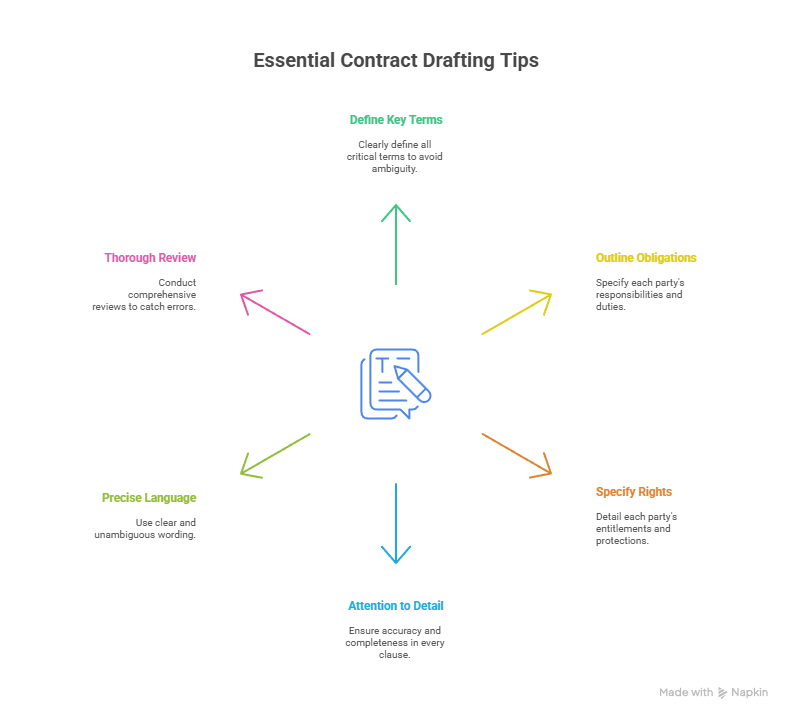Contracts in India are governed primarily by the Indian Contract Act, 1872, along with sector-specific laws. A well-drafted contract is not only about protecting your business interests—it’s also about ensuring enforceability in Indian courts or tribunals.
Unfortunately, many businesses rely on vague, copied, or poorly drafted contracts. This often leads to disputes, long litigation, and sometimes even contracts being declared void or unenforceable.
Here are 10 essential drafting tips for Indian contracts, along with what could go wrong if you don’t follow them.

1. Use Clear and Simple Language
Why: Indian courts interpret contracts based on the intention of the parties. If language is vague, judges may interpret it differently than you intended.
If you don’t follow this:
- Ambiguity may lead to multiple interpretations in court.
- Disputes may drag on for years because of unclear clauses.
Example: If “delivery” isn’t defined, one party may assume it means “shipping” while the other assumes “installation.”
2. Define Key Terms Upfront
Why: The Indian Contract Act recognizes only what is clearly agreed. Undefined terms create loopholes.
If you don’t follow this:
- Courts may strike down vague terms as uncertain under Section 29 of the Contract Act (agreements void for uncertainty).
- The whole contract could be unenforceable.
Example: If “services” are not defined, the provider may do less work than expected, yet still claim compliance.
3. Be Specific About Rights and Obligations
Why: Obligations must be precise to be enforceable.
If you don’t follow this:
- The other party can exploit vague obligations.
- You may lose in court because the promise is not “determinable.”
Example: Instead of saying “Vendor will deliver goods promptly,” specify “Vendor will deliver 500 chairs by 30 Sept 2025 at the client’s Bangalore office.”
4. Cover Payment Terms in Detail
Why: Payment disputes are a huge cause of litigation in Indian contracts.
If you don’t follow this:
- The other party may delay payment indefinitely, arguing “promptly” or “within reasonable time.”
- Without late fee or interest clauses, you cannot claim compensation unless you sue under Interest Act, 1978, which is slow.
Example: Always state: amount, currency, mode, deadline, and late payment penalty (e.g., 2% per month).
5. Include a Dispute Resolution Clause
Why: India’s courts are overburdened; commercial suits often take 10+ years. Arbitration and mediation are faster alternatives under the Arbitration and Conciliation Act, 1996.
If you don’t follow this:
- Your dispute will go to civil court by default—expect years of delay and high costs.
- You lose control over where and how disputes are resolved.
Example: “All disputes shall be referred to arbitration under the Arbitration and Conciliation Act, 1996. The seat of arbitration shall be New Delhi. The award shall be binding.”
6. Address Termination Conditions
Why: Contracts must specify how they can end, otherwise termination becomes a dispute.
If you don’t follow this:
- The other party may refuse to exit, keeping you locked in.
- Courts may order specific performance (forcing you to continue the contract).
Example: “Either party may terminate with 30 days’ notice if the other fails to cure a material breach within 15 days of notice.”
7. Ensure Legal Compliance
Why: Contracts that violate Indian laws are void ab initio (Section 23 of the Contract Act).
If you don’t follow this:
- Non-compliant contracts (e.g., illegal employment terms, unfair trade clauses) cannot be enforced.
- This means that if one party fails to fulfill its obligations, the other party has no legal recourse to seek remedies or damages
8. Protect Confidential Information
Why: India doesn’t yet have a comprehensive data protection law (though the Digital Personal Data Protection Act, 2023 is coming). Confidentiality clauses are the only protection for sensitive data.
If you don’t follow this:
- The other party can legally disclose your data, unless you sue under breach of trust (harder to prove).
- Trade secrets can leak without remedy.
Example: Include a Non-Disclosure Agreement (NDA) clause covering trade secrets, client lists, financials.
9. Plan for Unexpected Events (Force Majeure)
Why: Indian law does recognize impossibility (Section 56, Contract Act), but courts apply it narrowly. A force majeure clause provides wider protection.
If you don’t follow this:
- You may still be held liable for non-performance during events like lockdowns, strikes, or supply chain disruptions.
- You might have to pay damages for circumstances beyond your control.
Example: During COVID-19, many businesses without force majeure clauses faced claims for breach of contract.
10. Specify Governing Law and Jurisdiction
Why: In India, contracts must state which law governs them and which court (or arbitration seat) has jurisdiction. Without this, parties may drag disputes into inconvenient courts across the country.
If you don’t follow this:
- You could be forced to defend a case in a faraway state where the other party files the suit.
- Jurisdiction battles themselves can take years before the real dispute even begins.
- Different state high courts may interpret laws differently, creating added uncertainty.
Example:
- “This Agreement shall be governed by and construed in accordance with the laws of India. Subject to the arbitration clause, the courts at Mumbai shall have exclusive jurisdiction.”




